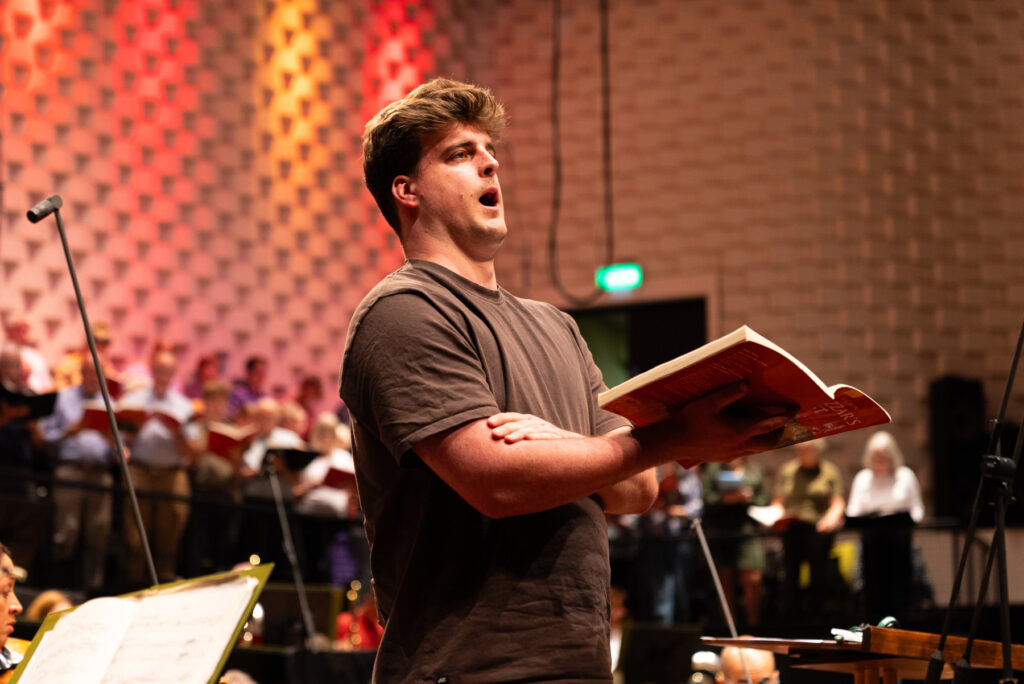Hats off to David Hill for overseeing the Bournemouth Symphony Orchestra’s last hurrah of the season with three career-defining works that changed the musical landscape in both Britain and the States.
Bernstein’s West Side Story, from which his Symphonic Dances were arranged in 1960, was a shot in the arm for the American Musical, while Gershwin’s Rhapsody in Blue boldly crossed musical frontiers to cause a sensation at its 1924 New York premiere in a programme entitled “An Experiment in Modern Music”. No less contemporary-sounding, at the time, was Walton’s jazz-influenced oratorio, Belshazzar’s Feast, which became a huge critical and public success after its Leeds Premiere in 1931, notwithstanding objections from the sopranos and altos for having to sing the word ‘concubines’.
Each of the three works make exceptional demands on players and singers, and these were met with varied success. Proceedings began with Bernstein’s Dances, with Hill generating a blistering account, and the BSO players alert to every rhythmic pull and push in a tension-filled ‘Prologue’, antagonisms between the rival gangs vividly portrayed. Velvet strings and a rapt solo viola added to the dream-like quality of ‘Somewhere’, while a breezy ‘Scherzo’ was savagely cut short by the testosterone-fuelled ‘Mambo’, the players revelling in the score’s Big Band sonorities, trumpets scorching the air. A smoky saxophone and funky piano brought spicy seasoning to ‘Cool Fugue’ and a lonely flute initiated an atmospheric ‘Finale’, earlier dreaming now intensely poignant and the spirit of the music revealed in all its essence.

Like Bernstein, Gershwin had a natural melodic gift and found expressive outlet in dozens of ‘hit’ songs, a single concerto, an opera and this evergreen Rhapsody. While Bernstein confessed that Gershwin was his “idol”, he dismissed the work as “a string of separate paragraphs stuck together with a thin paste of flour and water”. However true that may be from a technical point of view, the work’s appeal remains undimmed. And this was given one of those freshly minted, and characterful renditions, with solo pianist Steven Osborne underlining Gershwin’s bold conception and bringing considerable muscle to the piano writing, making clear this was not going to be one of those readings where every phrase is politely delivered. Instead, this was a bracing collaboration, tempi pushing forward and veering, at times, towards the hazardous. Osborne’s account was not without scintillation or soulful rumination and if scherzando passages felt more harried than playful, one was never in any doubt of his virtuosity. The big tune was lovingly presented, nothing cloying here, but an expansive unveiling drawing out rich orchestral layers. Then on to those joyous closing bars, with grandeur allied to unbuttoned roistering. After tumultuous applause, Osborne turned to another jazz giant for his encore: Oscar Peterson’s arrangement of Duke Ellington’s ‘Things ain’t What They Used To Be’.
The glamour of the 1920’s evidently rubbed off on Walton who absorbed some of its jazzy traits in a work that closely follows in the tradition of the great 18th and 19th century English oratorios. Aside from biblical correspondences, Belshazzar’s Feast dares to be different from its forebears, with both its continuous drama and ambitious scoring for double mixed chorus (double semi-chorus), large orchestra and two brass bands, thrown in at the suggestion of Thomas Beecham who didn’t anticipate further outings after the cantata’s premiere. To pull off this extraordinary work with the necessary degree of conviction is no small ask, and here the performance was mostly successful. Hill’s galvanising approach ensured it all worked efficiently, with the opening declamation of Elijah’s prophecy ringing out magnificently from the tenors and basses; the closing ‘Alleluias’, evoking the fall of Babylon, were suitably impressive too. In between, the chorus (just shy of 150) were occasionally underpowered, their lamenting and pagan revels a little inhibited. Baritone Andrew Hamilton brought authority to his role, yet sounded effortful at times, though his clearly articulated ‘shopping list’, itemising the riches of Babylon, was delivered with élan. When his voice matures his will surely be a name to watch out for. Meanwhile, the BSO was superbly incisive, antiphonally placed brass providing periodic excitement either side of a stage full to bursting, and Hill coaxing every ounce of energy from his forces. Bravo!
David Truslove
Programme:
Bernstein – Symphonic Dances: West Side Story; Gershwin – Rhapsody in Blue; Walton – Belshazzar’s Feast
Bournemouth Symphony Orchestra, Bournemouth Symphony Chorus, Steven Osborne – piano; Andrew Hamilton – baritone; David Hill – Conductor
The Lighthouse, Poole, 14 May 2025
Top image: The BSO in rehearsal at the Lighthouse
Photos: © Bournemouth Symphony Orchestra